With Covid cases surging in many parts of the country, the government has issued fresh guidelines for states to strictly enforce containment measures, surveillance and caution to fully overcome the pandemic. The guidelines will be effective from December 1 till the end of the month.
States have been allowed to assess the situation to impose local restrictions to contain the spread of Covid-19 such as night curfews but they cannot impose any local lockdowns outside the containment zones, without prior consultation with the Central Government.
In cities where the weekly case positivity rate is more than 10 per cent, states have been asked to implement staggered office timings and other suitable measures to reduce the number of employees attending office at the same time.
For observance of social distancing in crowded places, especially in markets, weekly bazaars and public transport, the home ministry said that the Ministry of Health and Family Welfare will issue a standard operating procedure, which shall be strictly enforced by states and UTs.
The guidelines issued by the home ministry have also clarified that there would be no restriction on inter-State and intra-State movement of persons and goods including those for cross land-border trade under treaties with neighbouring countries. No separate permission or approval or an e-permit will be required for such movements.
The government has said that the local district, police and municipal authorities would be responsible to ensure that the prescribed containment measures are strictly followed and state governments shall ensure the accountability of the officers concerned.
Certain activities have been permitted with restrictions outside the containment zones such as International air travel of passengers, as permitted by home affairs ministry, opening cinema halls and theatres, with upto 50 percent capacity, social, cultural, entertainment or religious gatherings with upto a maximum of 50 percent of the hall capacity, with a ceiling of 200 persons in closed spaces. States however, have been allowed to reduce this upper limit based on the situation to 100 persons or less, in closed spaces.
Within the containment zones, there has to be intensive house-to-house surveillance by surveillance teams formed for the purpose and strict perimeter control to ensure that there is no movement of people in or out of these zones, except for medical emergencies and for maintaining supply of essential goods and services.
Listing of contacts would be carried out in respect of all persons found positive, along with their tracking, identification, quarantine and follow up of contacts for 14 days. Eighty per cent of contacts are requuired to be traced in 72 hours in such zones.
 Dear Reader,
Dear Reader,
Business Standard has always strived hard to provide up-to-date information and commentary on developments that are of interest to you and have wider political and economic implications for the country and the world. Your encouragement and constant feedback on how to improve our offering have only made our resolve and commitment to these ideals stronger. Even during these difficult times arising out of Covid-19, we continue to remain committed to keeping you informed and updated with credible news, authoritative views and incisive commentary on topical issues of relevance.
We, however, have a request.
As we battle the economic impact of the pandemic, we need your support even more, so that we can continue to offer you more quality content. Our subscription model has seen an encouraging response from many of you, who have subscribed to our online content. More subscription to our online content can only help us achieve the goals of offering you even better and more relevant content. We believe in free, fair and credible journalism. Your support through more subscriptions can help us practise the journalism to which we are committed.
Support quality journalism and subscribe to Business Standard.
Digital Editor

RECOMMENDED FOR YOU